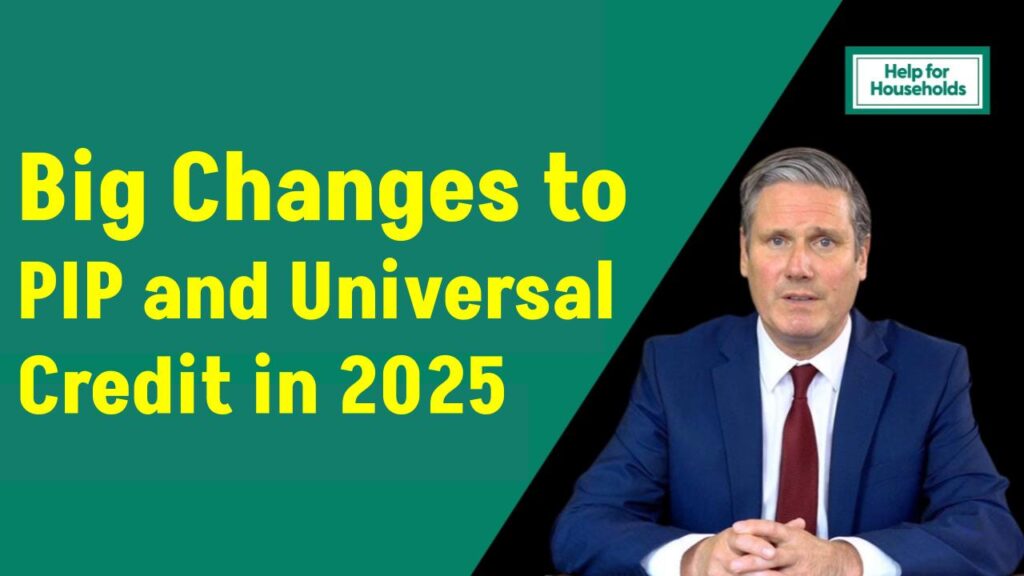Massive Universal Credit & PIP Updates in 2025: The UK government has introduced sweeping changes to Universal Credit (UC) and Personal Independence Payment (PIP) in 2025 as part of a £5 billion welfare reform initiative. While the goal is to encourage more people into work and reduce public spending, the proposals have sparked concern across the country, especially among vulnerable populations.

In this detailed article, we break down what’s changing, how it may affect your benefits, and what steps you can take to protect your income.
Massive Universal Credit & PIP Updates in 2025
| Detail | Information |
|---|---|
| Universal Credit Health Element | Reduced from £97 to £50 per week for new claimants post-April 2026 |
| PIP Eligibility | Must score 4+ points in one daily living activity (starting 2026) |
| Who May Lose Out | Estimated 800,000 to lose PIP eligibility by 2030 |
| Financial Impact | Potential loss of up to £6,300 per person per year |
| Cost of Living Payments | Up to £950 in 2025 (including disability and pensioner supplements) |
| Support Measures | £1 billion investment in job support and “Right to Try” program |
| Official Source | gov.uk |
The 2025 reforms to Universal Credit and PIP mark a major shift in how the UK supports low-income and disabled citizens. While some may benefit from increased standard allowances and employment support, others face steep cuts and tighter eligibility.
Staying informed, reviewing your options, and taking proactive steps will be key to managing these changes effectively.
Understanding the 2025 Welfare Reform Plan
The Spring Statement 2025 outlined several key changes to the UK’s benefits system. The government argues that these changes will encourage employment, reduce dependency, and support long-term economic growth.
However, critics say the proposals risk cutting support for some of the country’s most vulnerable citizens, including disabled individuals and low-income families.
Major Reductions: What Benefits Are Being Cut?
1. Personal Independence Payment (PIP) Eligibility Tightening
From November 2026, a stricter rule will apply: you must score at least 4 points on one single daily living activity to qualify for the PIP daily living component. Earlier, people could accumulate points across several activities.
- Impact: An estimated 800,000 people will lose eligibility.
- Loss: Annual losses could range from £4,200 to £6,300 per person.
2. Universal Credit (UC) Health Element Cuts
For new claimants applying after April 2026, the UC health component will be slashed from £97 to £50 per week, and frozen until 2030.
- Existing claimants will retain the current £97 but also face a freeze.
- Young adults under 22 will no longer be eligible for this component.
3. Combined Impact on Claimants
Many claimants who currently receive both PIP and the UC health element face steep financial losses.
- Total reduction: Some individuals may lose up to £416 per month.
- Poverty risk: Think tanks warn that up to 350,000 people, including 50,000 children, could fall into poverty.
What’s Increasing or Being Added in Universal Credit & PIP Benefits in 2025?
1. Universal Credit Standard Allowance Rise
To offset some cuts, the standard UC allowance will increase gradually from £92 to £106 per week by 2029/30. This exceeds inflation projections and is aimed at working families not receiving health-related benefits.
- 3.9 million families could benefit from this adjustment.
2. 2025 Cost of Living Payments
Eligible claimants will receive several support payments throughout 2025:
- £301 in Spring
- £300 in Summer
- £299 in Autumn
- £150 Disability Payment (mid-year)
- £150–£300 Pensioner Payment (winter 2025/26)
These payments will be automatic for those receiving UC, PIP, DLA, or Pension Credit.
3. Employment Support: “Right to Try” and Investment Boost
The government plans to invest £1 billion per year by 2030 in job support schemes. This includes:
- Personalized work assistance for people with health conditions.
- “Right to Try” policy allowing claimants to try working without losing benefits immediately.
Political Reactions and Public Backlash
These changes have sparked internal conflict within the Labour Party, with over 50 MPs openly criticizing the reforms. They argue the policies disproportionately affect disabled people and low-income families.
- Electoral risks: In nearly 200 constituencies, the number of people receiving PIP exceeds the MPs’ majority—creating potential vulnerabilities for sitting members.
What Should You Do If You’re Affected?
1. Stay Updated
- Follow official guidance from the Department for Work and Pensions (DWP).
2. Recheck Your Eligibility
- Review your current benefit entitlements. Use online calculators or consult an advisor.
3. Get Help
- Contact charities and support organisations like Citizens Advice or Turn2Us.
4. Prepare for Appeals
- If your benefits are reduced, be ready to file a Mandatory Reconsideration or appeal the decision at a tribunal.
New Universal Credit Rules Just Dropped—Will You Still Qualify in 2025?
Easter 2025 DWP Payment Shake-Up: Will Your Benefits Arrive Early This Year?
Shocking DWP Benefit Changes in 2025: What Every UK Family Needs to Know Right Now
FAQs on Massive Universal Credit & PIP Updates in 2025
Will my benefits stop completely in 2025?
No, but you may receive less if you don’t meet the new eligibility rules starting from 2026.
Is this only for new claimants?
Some changes apply only to new claimants (e.g., UC health element cut), while others, like PIP eligibility, will affect both existing and new claimants.
How do I know if I qualify for Cost of Living Payments?
If you’re receiving UC, PIP, DLA, or Pension Credit, you should receive these payments automatically.
Can I still work part-time and keep benefits?
Yes—especially under the “Right to Try” scheme, which lets you test employment without immediately losing support.










